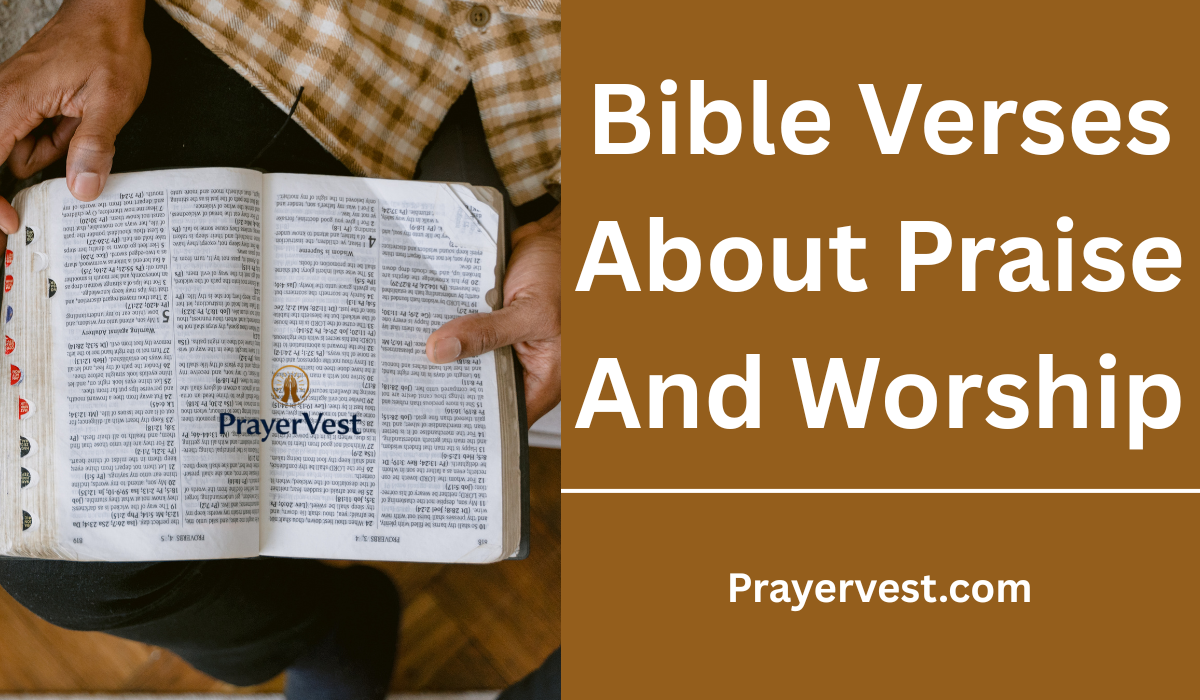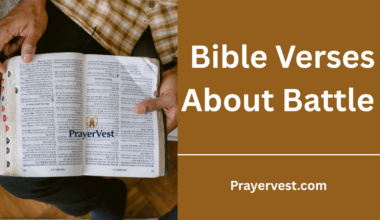As potent manifestations of our love, thankfulness, and respect for God, praise and worship are central to the Christian life. Scripture exhorts us to praise the One who created and redeemed us by raising our voices, our hearts, and even our whole lives.
While worship goes deeper, leading us into a posture of humility, submission, and connection with God, praise recognizes God’s greatness by proclaiming His magnificent acts and faithfulness. Praise and worship work together to change our hearts and align us with God’s will, bringing us closer to His presence.
From David’s happy songs to Revelation’s celestial visions of worship, the Bible is replete with passages that highlight the value of praise and worship. These verses demonstrate that worship is a way of life rather than being limited to a specific time, hymn, or location.
It manifests itself in acts of service, prayer, singing, and adherence to God’s Word. Praise reminds us of God’s goodness and sovereignty, lifting our gaze from our problems on earth to His majesty. In turn, worship makes room for us to meet His Spirit and feel His strength, serenity, and rejuvenation.


Praise heightens our thankfulness during happy times, while worship grounds our spirits in God’s constant presence during difficult ones. Bible passages about worship and praise serve as a reminder that God takes pleasure in our adoration and that He is present in His people’s praises. As we consider these verses, we see that worship is about developing a heart that elevates God above all things, not only about music or ritual. We can live in the fullness of His glory and strengthen our connection with Him by accepting this calling.
40 Uplifting Bible Verses About Praise And Worship (2026)
1. Psalm 9:1
“I will give thanks to you, Lord, with all my heart; I will tell of all your wonderful deeds.”
This psalm captures the essence of wholehearted praise. David not only acknowledges God’s works but also commits to proclaiming them openly. Praise in this sense is both personal and public—rooted in gratitude and expressed in testimony. When we declare God’s goodness, we inspire others to join in worship, creating a ripple effect of thanksgiving that honors His name.
2. Psalm 29:2
“Ascribe to the Lord the glory due his name; worship the Lord in the splendor of his holiness.”
Here, worship is described as an act of giving—offering God the honor and glory that already belong to Him. This verse emphasizes the holiness of God and the reverence that should accompany worship. True praise requires us to recognize His majesty, humbly bowing before Him in awe. It is not about personal preference or style, but about rendering to God what He alone deserves: glory, reverence, and honor.
3. Psalm 34:1
“I will extol the Lord at all times; his praise will always be on my lips.”
This verse highlights the consistency of praise as a lifestyle rather than an occasional act. David commits to blessing the Lord in every circumstance—whether in joy, sorrow, or uncertainty. Worship that flows continually from the heart demonstrates unshakable faith and a deep trust in God’s sovereignty. It encourages us to make praise not just an event but an ongoing expression of devotion.
4. Psalm 95:6
“Come, let us bow down in worship, let us kneel before the Lord our Maker.”
This passage invites believers into a posture of humility before God. Worship is not merely about singing songs but about surrender—bowing and kneeling as acts of reverence. The verse reminds us that God is our Creator, and as such, He is worthy of our deepest honor. In kneeling before Him, we acknowledge His authority, His power, and our complete dependence on His grace.
5. Psalm 96:1–2
“Sing to the Lord a new song; sing to the Lord, all the earth. Sing to the Lord, praise his name; proclaim his salvation day after day.”
This psalm calls for fresh expressions of worship that celebrate God’s ongoing work in our lives. The “new song” symbolizes renewed gratitude and creativity in praise. Worship here is not limited to a single nation but extends to “all the earth,” showing God’s universal reign. Our daily proclamation of His salvation is a continual testimony of His power and love.
6. Psalm 100:1–2
“Shout for joy to the Lord, all the earth. Worship the Lord with gladness; come before him with joyful songs.”
Psalm 100 paints worship as an overflow of joy and gladness. Worship is not meant to be dry or forced, but filled with life and celebration. This verse encourages believers to come into God’s presence with thanksgiving and songs of joy. It portrays praise as a communal act where the whole earth is invited to participate in honoring the Lord.
7. Psalm 103:1
“Praise the Lord, my soul; all my inmost being, praise his holy name.”
David begins this psalm with a call to himself, urging every part of his being to bless the Lord. True worship involves not only outward expressions but also the inward devotion of the heart. By commanding his soul to worship, David shows that praise is sometimes an act of will, not just emotion. Worship that comes from the depths of our being is sincere, powerful, and pleasing to God.
8. Psalm 111:1
“Praise the Lord. I will extol the Lord with all my heart in the council of the upright and in the assembly.”
Here, worship is both personal and communal. The psalmist vows to give wholehearted praise before others, declaring God’s goodness openly. This verse highlights the importance of corporate worship, where the community of believers gathers to magnify God together. Public praise is a testimony of faith that strengthens unity and encourages others to join in adoring the Lord.
9. Psalm 113:3
“From the rising of the sun to the place where it sets, the name of the Lord is to be praised.”
This verse expresses the continual nature of praise—spanning the entire day, from sunrise to sunset. Worship is not confined to a specific time but is meant to be a constant acknowledgment of God’s greatness. It also shows that God is worthy of praise in every season of life, across every culture and nation. His name deserves glory throughout the earth at all times.
10. Psalm 150:6
“Let everything that has breath praise the Lord. Praise the Lord.”
The final verse of the Psalms ends with a powerful universal call. All creation that breathes is commanded to worship the Lord, emphasizing the all-encompassing nature of praise. Worship is not reserved for a select group of people—it is the rightful response of every living being to the Creator. This verse reminds us that as long as we have breath, we are called to glorify God.
11. Psalm 7:17
“I will give thanks to the Lord because of his righteousness; I will sing the praises of the name of the Lord Most High.”
This verse reveals that worship flows out of gratitude for God’s righteousness. The psalmist acknowledges that God’s character is the reason for thanksgiving and praise. Singing to the “Most High” emphasizes His sovereignty and supreme authority. True worship begins with recognizing who God is and responding with thanksgiving.
12. Psalm 18:3
“I called to the Lord, who is worthy of praise, and I have been saved from my enemies.”
Praise is closely tied to God’s deliverance. The psalmist worships because the Lord has proven Himself faithful in times of trouble. This verse reminds us that praise is not only about acknowledging God’s attributes but also about remembering His mighty acts of salvation in our lives. When God rescues us, the natural response is heartfelt worship.
13. Psalm 22:3
“Yet you are enthroned as the Holy One; you are the one Israel praises.”
This powerful verse depicts God as dwelling in the praises of His people. Worship is more than just singing—it creates a space where God’s presence is enthroned. When believers gather in adoration, they invite His glory into their midst. This truth emphasizes the sacred power of praise in establishing intimacy with God.
14. Psalm 28:7
“The Lord is my strength and my shield; my heart trusts in him, and he helps me. My heart leaps for joy, and with my song I praise him.”
Here, worship is the overflow of a trusting heart. The psalmist recognizes God as both protector and helper, and the result is a joyful song of praise. Worship is not mechanical but springs from deep gratitude for God’s strength and faithfulness. When we experience His protection and guidance, praise becomes a natural response.
15. Psalm 30:4
“Sing the praises of the Lord, you his faithful people; praise his holy name.”
This verse is a call for collective worship among the faithful. The psalmist urges the community of believers to unite in glorifying God’s holy name. Praise here is not an individual act alone but a shared celebration of God’s goodness. It reminds us that worship strengthens unity and fosters joy among God’s people.
16. Psalm 40:3
“He put a new song in my mouth, a hymn of praise to our God. Many will see and fear the Lord and put their trust in him.”
Worship has the power to witness. When God transforms our lives, He gives us a new song—a testimony of His goodness. As we sing this song of praise, others are drawn to recognize His power and may come to trust in Him. Worship, then, is not only about honoring God but also about pointing others to Him.
17. Psalm 42:11
“Why, my soul, are you downcast? Why so disturbed within me? Put your hope in God, for I will yet praise him, my Savior and my God.”
This verse shows that praise is an act of faith even in discouragement. The psalmist speaks to his own soul, choosing worship over despair. Worship becomes a declaration of hope and trust in God’s salvation. It reminds us that praise is powerful medicine for a weary heart.
18. Psalm 47:1
“Clap your hands, all you nations; shout to God with cries of joy.”
This verse invites the nations to worship God with energy and celebration. Worship is not always quiet—it can be loud, joyful, and full of expression. Clapping and shouting reflect an outward overflow of inward praise. It shows that worship is both emotional and communal, engaging the body as well as the spirit.
19. Psalm 63:3-4
“Because your love is better than life, my lips will glorify you. I will praise you as long as I live, and in your name I will lift up my hands.”
The psalmist treasures God’s love above even life itself, leading him to a lifetime of worship. Lifting hands is a physical expression of surrender and honor to God. This verse reminds us that genuine praise is motivated by an encounter with God’s unfailing love. Worship becomes a lifelong response of devotion and gratitude.
20. Psalm 66:4
“All the earth bows down to you; they sing praise to you, they sing the praises of your name.”
This verse anticipates a time when all creation will bow in worship before God. Praise is universal, transcending nations and generations. Singing to His name reflects both reverence and intimacy. Worship, in this context, is not confined to a single people but is the destiny of the entire earth.
21. Psalm 67:3–4
“May the peoples praise you, God; may all the peoples praise you. May the nations be glad and sing for joy, for you rule the peoples with equity and guide the nations of the earth.”
This psalm highlights the global scope of worship. Praise is not restricted to Israel but is extended to all peoples and nations. It celebrates God’s just rule and guidance, showing that His governance brings joy to the nations. Worship here becomes a unifying force, bringing together diverse people under the banner of God’s reign.
22. Psalm 68:4
“Sing to God, sing in praise of his name, extol him who rides on the clouds; rejoice before him—his name is the Lord.”
This verse emphasizes God’s majesty and authority over creation. Singing to His name recognizes His glory, while rejoicing before Him reflects the joy that flows from His presence. God’s exalted position as the One who rides on the clouds shows His supreme power, reminding us that praise is a fitting response to His sovereignty.
23. Psalm 69:30
“I will praise God’s name in song and glorify him with thanksgiving.”
Worship here is expressed through both song and gratitude. Praise and thanksgiving go hand in hand, as acknowledging God’s goodness leads naturally to songs of adoration. The psalmist reminds us that worship is not only about melody but about a thankful heart that glorifies God in all circumstances.
24. Psalm 71:8
“My mouth is filled with your praise, declaring your splendor all day long.”
This verse paints a picture of continual worship. The psalmist’s life is so saturated with God’s goodness that praise becomes his constant expression. Declaring God’s splendor “all day long” shows that worship is a lifestyle, not a moment. Our mouths should be fountains of adoration, continually honoring the One who sustains us.
25. Psalm 84:4
“Blessed are those who dwell in your house; they are ever praising you.”
This verse highlights the blessing of living in God’s presence. Those who dwell close to Him naturally overflow with praise. Worship is not forced but becomes the natural rhythm of those who remain in His presence. This reminds us that nearness to God produces a heart of continuous adoration.
26. Psalm 86:12
“I will praise you, Lord my God, with all my heart; I will glorify your name forever.”
Wholehearted worship is the theme of this verse. The psalmist offers praise without reservation, glorifying God with complete devotion. The commitment to glorify God “forever” reflects worship as both a present reality and an eternal practice. Our praise on earth is simply preparation for the eternal worship of heaven.
27. Psalm 92:1
“It is good to praise the Lord and make music to your name, O Most High.”
This verse describes praise as inherently good. Making music to the Lord is a joyful and fitting response to His majesty. Worship through music is not only pleasing to God but also good for the soul, lifting our spirits and aligning us with His greatness. The psalmist reminds us that praising God is both duty and delight.
28. Psalm 95:1
“Come, let us sing for joy to the Lord; let us shout aloud to the Rock of our salvation.”
Here, worship is portrayed as exuberant and communal. Singing and shouting for joy are expressions of faith directed toward God, who is our Rock and salvation. The verse reminds us that worship is not passive but active, engaging the voice and spirit with enthusiasm. It calls believers to joyful unity in glorifying God.
29. Psalm 98:4
“Shout for joy to the Lord, all the earth, burst into jubilant song with music.”
This verse emphasizes the global celebration of God’s greatness. Worship is marked by joy and music, with the entire earth invited to participate. The imagery of bursting into jubilant song conveys overwhelming delight in God’s presence. Worship is presented as a joyful explosion of praise that cannot be contained.
30. Psalm 103:22
“Praise the Lord, all his works everywhere in his dominion. Praise the Lord, my soul.”
The psalmist calls all creation—every work of God’s hands—to join in praise. This universal call emphasizes that everything under God’s dominion is meant to glorify Him. The verse concludes with a personal reminder to the psalmist’s own soul, showing that worship begins within before it expands outward to all creation.
31. Psalm 104:33
“I will sing to the Lord all my life; I will sing praise to my God as long as I live.”
This verse highlights a lifelong commitment to worship. The psalmist declares that singing to the Lord will be the rhythm of his entire existence. Worship is not seasonal or circumstantial—it is a lifelong devotion. As long as we have breath, our purpose remains to glorify the One who gives life.
32. Psalm 105:1–2
“Give praise to the Lord, proclaim his name; make known among the nations what he has done. Sing to him, sing praise to him; tell of all his wonderful acts.”
This passage combines praise with proclamation. Worship not only glorifies God but also serves as a testimony to others. Singing and speaking of His deeds becomes a way of spreading His glory among the nations. Praise, then, is both an act of devotion and a means of evangelism.
33. Psalm 106:1
“Praise the Lord. Give thanks to the Lord, for he is good; his love endures forever.”
This verse centers worship on God’s goodness and enduring love. Praise here flows out of gratitude for His steadfast character. It reminds us that even when circumstances change, God’s love remains constant, giving us an unshakable reason to worship Him.
34. Psalm 107:8
“Let them give thanks to the Lord for his unfailing love and his wonderful deeds for mankind.”
Here, worship is grounded in gratitude for God’s acts of kindness and His unfailing love. The psalmist encourages believers to respond with thanksgiving, recognizing God’s continual intervention in human lives. Praise is our response to His faithfulness and provision.
35. Psalm 108:3
“I will praise you, Lord, among the nations; I will sing of you among the peoples.”
This verse demonstrates worship as a public declaration that extends beyond personal devotion. The psalmist vows to praise God not just privately but openly, among the nations. Worship is meant to be visible and contagious, pointing others to the greatness of God.
36. Psalm 109:30
“With my mouth I will greatly extol the Lord; in the great throng of worshipers I will praise him.”
The psalmist emphasizes vocal praise in the presence of a community of worshipers. This verse shows the power of collective adoration, where many voices unite in lifting up the Lord’s name. Worship becomes a shared celebration that magnifies God’s glory.
37. Psalm 115:18
“It is we who extol the Lord, both now and forevermore. Praise the Lord.”
This verse underscores the eternal nature of worship. The psalmist affirms that praise is not only for the present but for all eternity. Worship is our ongoing privilege and will continue forever in God’s presence.
38. Psalm 116:17
“I will sacrifice a thank offering to you and call on the name of the Lord.”
Here, worship is described as sacrificial, involving both gratitude and devotion. Offering thanks to God is an act of surrender and acknowledgment of His goodness. True worship often involves sacrifice, reminding us that praise is not only expressed in words but also in actions.
39. Psalm 135:3
“Praise the Lord, for the Lord is good; sing praise to his name, for that is pleasant.”
This verse ties worship to God’s goodness and declares it pleasant and beautiful to sing to His name. Worship is not a burden but a joy, both for the worshiper and for God. It brings delight, peace, and a sense of closeness with the Lord.
40. Psalm 145:2
“Every day I will praise you and extol your name for ever and ever.”
This verse ends the list with a daily commitment to worship. Praise is presented as a continual discipline, extending into eternity. The psalmist declares an unending devotion, reminding us that true worship is both a daily rhythm and an everlasting practice in God’s presence.
Conclusion
In summary, worship and praise are spiritual practices that influence our connection with God rather than merely being actions we take. According to what the Bible says, worship brings us closer to the Lord through reverence and surrender, and praise honors Him for who He is and what He has accomplished. These exercises give us strength, joy, and serenity by lifting our gaze from the difficulties of life to God’s majesty. We allow God’s presence and power to be experienced in all area of our lives when we make worship and praise a daily habit rather than a sporadic ceremony.
In the end, the Bible serves as a reminder that God is pleased when His people truly honor and respect Him. We respect Him when we put His name above all else, whether through music, prayer, or deeds of obedience. May we be motivated to live with hearts that always exalt God as we consider these Bible passages about praise and worship. By doing this, we become genuine vessels of His love and presence, growing in faith and shining His light on the world.






